The Acer Aspire S7-393 Review: Broadwell Comes To Acer's Ultrabook
by Brett Howse on October 5, 2015 8:00 AM ESTBattery Life and Charge Time
Broadwell brought a lot of nice changes over Haswell. The move to 14 nm transistors from the 22 nm of Haswell brought about lower operating voltages, which results in less power being dissipated. This of course means better battery life too. The CPU is only a small part of the overall power output of a notebook, especially at light workloads where most of the CPU can be power gated. The display is a big percentage of the overall power drain on light workloads, and other factors come into play too like the wireless card and even the SSD – or both SSDs in this case.
Something pretty remarkable is that Acer has sampled us nearly identical Aspire S7 models for the past three generations. That means that we have battery life results on an almost identical notebook going back to Ivy Bridge. All three S7 models all came with the same resolution display too. There may be some changes to backlight efficiency, but overall we can look at a single notebook and see how much more power efficient it has gotten in three generations which is pretty neat.
All tests are done with the default browser (now Edge) and the display set at 200 nits.
Light Battery
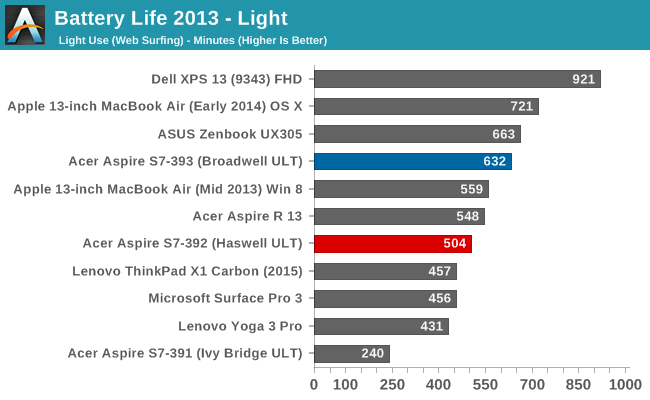
The light test consists of light web browsing with the display set at 200 nits. It is heavily influenced by the display, especially in 2015 where the processors are so power efficient at idle or close to it. The Aspire S7 does very well in this test coming in very close to the Core M powered UX305 from ASUS. Unsurprisingly it is no where near the Dell XPS 13 FHD model which blew past all other notebooks.
Looking at the past generations shows just how big of a jump notebooks have made in just a couple of years. The original S7 with Ivy Bridge got only 240 minutes, or 4 hours on this test, but the latest version gets 10.5 hours. Even compared to Haswell there is a big jump in efficiency.
Heavy Battery
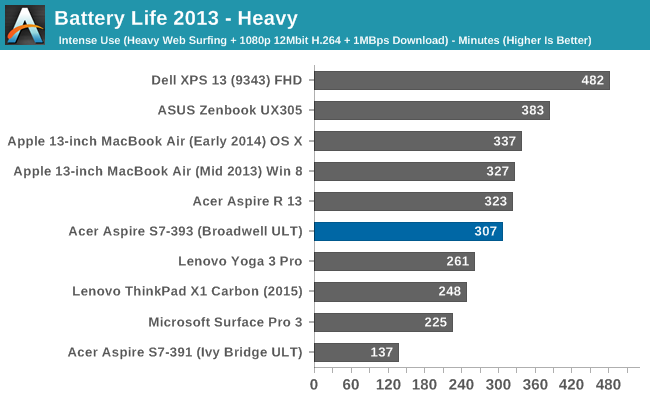
The heavy test ramps up the workload significantly, with much heavier web browsing combined with a 1 MB/s file download and a movie playing. The CPU becomes a much bigger factor here along with the wireless card.
Once again, the S7 does a reasonable job on this test. It has fallen a bit behind some of the other notebooks but not by a big amount. The exception is the Core M UX305, and of course the Dell XPS 13.
It is a pity, but the Haswell version of the S7 was not run through this test so we do not have a result from it, but clearly Broadwell is a huge step up from Ivy Bridge in terms of efficiency. The latest S7 is 124% more efficient at this test than Ivy Bridge. Impressive stuff.
Normalized Results
Next, we divide the time by the battery capacity to remove that from the equation. This gives us an apples to apples comparison of efficiency across devices.
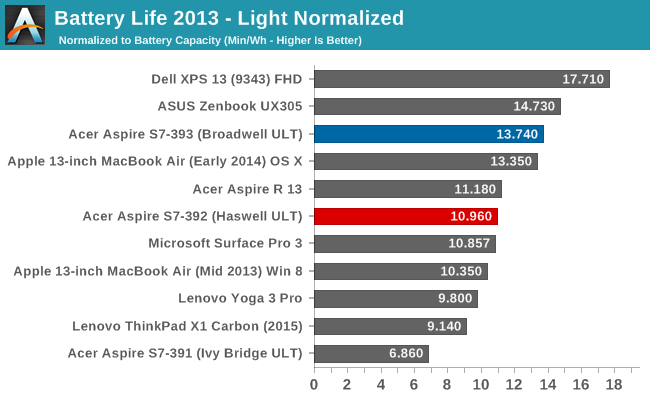
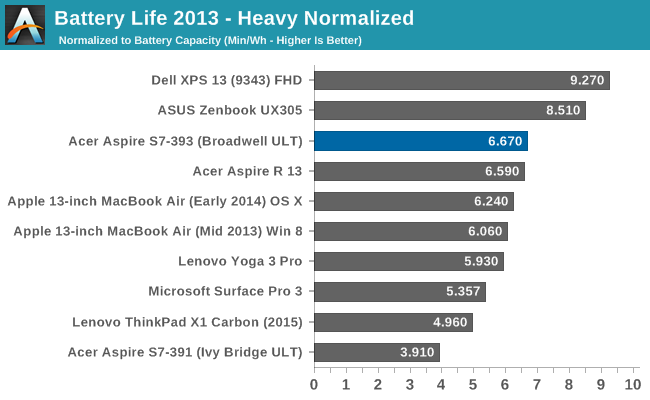
Acer has done a good job with platform efficiency, coming in as one of the higher results seen. It is really held back more by the 46 Wh battery, which is slightly below average as far as capacity on this size of an Ultrabook. Clearly a redesign would be the only way to squeeze in more battery capacity since it has not changed since the first S7. But despite a slightly smaller battery, the S7 still scores as one of the longest running notebooks we have seen, if you ignore the XPS 13 and its silly battery life.
Charge Time
The other side of the power equation is charge time, and while it may not be important to everyone, those times where you are travelling and only have a couple of minutes to grab some electrons before you move on having a quick charging notebook can be a big benefit. Acer has included a 45 Watt A/C adapter to charge the 46 Wh battery.
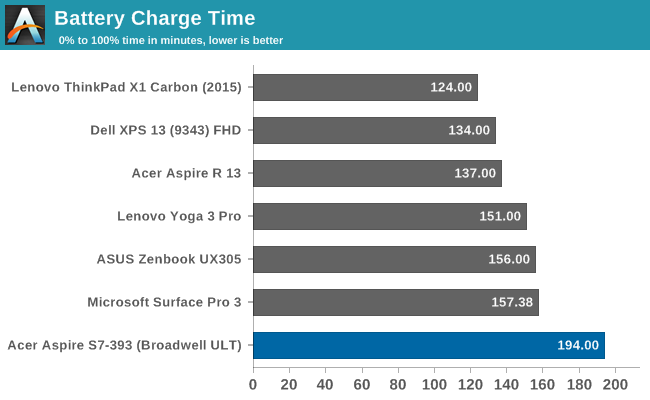
The Acer S7 takes a bit longer than most devices to get to 100% when it is powered up like it is in this test. It is always a trade-off to include a larger adapter because they can get big and heavy, and make it less useful to travel with.










63 Comments
View All Comments
Kristian Vättö - Monday, October 5, 2015 - link
RAID 0 SSDs in an Ultrabook just doesn't make any sense. A single SATA 6Gbps SSD is more than capable of pushing the bottleneck to the CPU under most workloads. Two SSDs just add cost, consume more power and eat up PCB area that could be used for a larger battery for instance.zepi - Monday, October 5, 2015 - link
Not to mention of M.2 PCI-e SSD's if manufacturer wants to offer more performance.LoganPowell - Friday, November 27, 2015 - link
It's a lot of money to drop on Acer Aspire... in my opinion. When there are much more price-worthy options on the market /Billie from http://www.consumerrunner.com/top-10-best-desktops...retrospooty - Monday, October 5, 2015 - link
You lost me at "Acer". Nothing they do makes sense. Nothing they make makes me want to buy.lmcd - Monday, October 5, 2015 - link
Highly disagreed. I find the Acer Aspire Switch 12 (2014 model) highly compelling as a current owner, especially in its heavily-discounted state. Core M and an active digitizer for $500?Samus - Monday, October 5, 2015 - link
That's $500. I'd consider an Acer in the $300-$500 ballpark, but not $1300.retrospooty - Tuesday, October 6, 2015 - link
Wait till it dies on youEthos Evoss - Tuesday, December 15, 2015 - link
bunch of usa moaners..on purpose trolling on acer..
Kutark - Monday, October 5, 2015 - link
I bought a V Nitro Black Edition a little less than a year ago and it was the best laptop purchase ive made in 15 years. I absolutely love it. I have another friend who bought the same laptop after seeing mine who is a PHD student doing research in genetics. He took the laptop and had the processor pegged at 100% for quite literally 3 weeks straight crunching numbers and it had no problems, not a single crash, nothing.rxzlmn - Friday, October 9, 2015 - link
I bought a V15 (non-black edition since I wanted a ULV with better battery life) and I am also absolutely happy with it. Happens that I also do my PhD in genomics - I could probably leave the laptop running for years without getting far though. I'm using HPC clusters with >2000 CPUs and terabytes of RAM. whatever your friend is telling you, a consumer computer won't be able to do any real PhD-grade genomics ;)